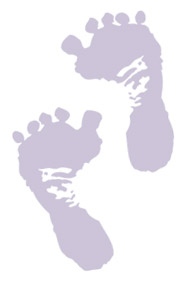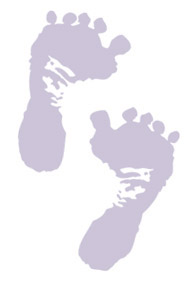Cystic Fibrosis
Information for Physicians and
Other Health Care Professionals
Definition
Cystic fibrosis (CF) is an inherited disorder that results in abnormal, thick secretions in the digestive and respiratory systems.
Clinical Symptoms
The clinical symptoms of cystic fibrosis vary between affected individuals. Some affected infants have meconium ileus, an intestinal obstruction caused by thick secretions at birth, but most infants appear healthy at birth. Poor growth and abnormal bowel movements appear in most children within the first year of life due to abnormal secretion by the pancreas gland, which results in malabsorption of fat and other nutrients. In the lungs, thick secretions lead to frequent cough, wheezing and susceptibility to respiratory tract infections. Respiratory symptoms sometimes occur during the first few weeks of life, but may not occur for years.
Newborn Screening and Definitive Diagnosis
The newborn screening test for cystic fibrosis has two components, measurement of immunoreactive trypsinogen (IRT) and assessment of the most common genetic mutations causing cystic fibrosis. Most infants with presumptive positive newborn screening tests will either be affected with cystic fibrosis or will be unaffected carriers of the CF trait.  Confirmation of CF diagnosis requires quantitative pilocarpine iontopheresis (QPIT) sweat chloride testing. Carrier infants most likely will have an abnormal CF gene detected by newborn screening, but a normal sweat test. Infants with positive newborn screening tests (elevated IRT and one or two common CF mutations, or an ultra high IRT level) require prompt follow-up, and when notified of these results, the clinician should refer the infant to a facility with experience in performing QPIT testing, as soon as possible. False positive and false negative results are possible with newborn screening for CF. Any infant with a family history of cystic fibrosis or clinical signs of the disorder, such as meconium ileus, should be referred to a CF specialist for further evaluation and QPIT testing, regardless of the newborn screening results.
Confirmation of CF diagnosis requires quantitative pilocarpine iontopheresis (QPIT) sweat chloride testing. Carrier infants most likely will have an abnormal CF gene detected by newborn screening, but a normal sweat test. Infants with positive newborn screening tests (elevated IRT and one or two common CF mutations, or an ultra high IRT level) require prompt follow-up, and when notified of these results, the clinician should refer the infant to a facility with experience in performing QPIT testing, as soon as possible. False positive and false negative results are possible with newborn screening for CF. Any infant with a family history of cystic fibrosis or clinical signs of the disorder, such as meconium ileus, should be referred to a CF specialist for further evaluation and QPIT testing, regardless of the newborn screening results.
Treatment
Early diagnosis and treatment of cystic fibrosis improves nutrition and reduces the risk of symptomatic fat-soluble vitamin deficiency. Most infants with cystic fibrosis require pancreatic enzyme supplements and water soluble forms of fat soluble vitamins for normal growth. Breast feeding should be encouraged, however some infants will need oral or enteral supplemental feeding to achieve normal growth. Close monitoring for respiratory symptoms, frequent oropharyngeal cultures for CF-related bacteria, and in most cases, preventive therapies to reduce the risk of respiratory exacerbations are prescribed. Multidisciplinary team care provided by physicians with special expertise in cystic fibrosis, specialist nurses, dieticians, respiratory therapists, genetic counselors and social workers is recommended. The Cystic Fibrosis Foundation (CFF) has published guidelines on preventive and maintenance medical care.
Incidence
Cystic fibrosis occurs in 1:3,200 Caucasians, 1:9,000 Hispanic Caucasians, 1:15,000 African Americans and 1:30,000 Asians in the United States. Currently, approximately 30,000 individuals affected with CF are living in the United States.
Inheritance Patterns
Cystic fibrosis is inherited in an autosomal recessive pattern. As an autosomal recessive disorder, the parents of a child with CF are unaffected, healthy carriers of the condition and have one normal gene and one abnormal gene.  With each pregnancy, carrier parents have a 25 percent chance of having a child with two copies of the abnormal gene resulting in CF. Carrier parents have a 50 percent chance of having a child who is an unaffected carrier and a 25 percent chance of having an unaffected, non-carrier child. These risks hold true for each pregnancy. All siblings of infants diagnosed with CF should receive medical evaluation and/or testing for CF, and genetic counseling services should be offered to the family. Because as many as 1:29 Caucasian adults are CF carriers, a
family identified as having a CF carrier infant may be at high risk of a subsequent child being affected. Genetic counseling and testing of parents, when desired, can further define this risk.
With each pregnancy, carrier parents have a 25 percent chance of having a child with two copies of the abnormal gene resulting in CF. Carrier parents have a 50 percent chance of having a child who is an unaffected carrier and a 25 percent chance of having an unaffected, non-carrier child. These risks hold true for each pregnancy. All siblings of infants diagnosed with CF should receive medical evaluation and/or testing for CF, and genetic counseling services should be offered to the family. Because as many as 1:29 Caucasian adults are CF carriers, a
family identified as having a CF carrier infant may be at high risk of a subsequent child being affected. Genetic counseling and testing of parents, when desired, can further define this risk.
Physiology
Cystic fibrosis occurs due to abnormalities in the cystic fibrosis transmembrane conductance regulator (CFTR) gene and its associated protein. The CFTR protein is an epithelial cell chloride channel and an important regulator of other epithelial chloride and sodium channels. The defective protein leads to abnormal salt transport onto epithelial surfaces, leading to dehydration of secretions. In the pancreas, obstruction of pancreatic ducts leads to pancreatic insufficiency, and in the lungs, dehydration of epithelial surfaces leads to abnormal mucociliary clearance and increased inflammation and infection. CFTR abnormalities are also associated with abnormalities in the liver, sometimes leading to liver disease. Most CF affected men are infertile due to associated congenital bilateral absence of the vas deferens.
Key Points for Parents
Avoid overly alarming the child’s parents if the diagnosis has not yet been confirmed. If the child needs additional testing or diagnostic evaluation, emphasize that definitive diagnosis is best obtained through referral to a qualified cystic fibrosis specialist for QPIT sweat chloride testing and genetic counseling.
Follow-up After Confirmation of Diagnosis
These guidelines should be followed after a diagnosis of cystic fibrosis has been confirmed:
- Parents should understand that treatment is lifelong and that regular evaluation and preventive care reduce symptoms and CF complications.
-
 Affected individuals should have regular follow-up with a physician with expertise in cystic fibrosis and a multidisciplinary care team.
Affected individuals should have regular follow-up with a physician with expertise in cystic fibrosis and a multidisciplinary care team.
- Parents should understand that current treatment is not curative and cannot prevent all of the complications of cystic fibrosis. However, frequent visits with a CF specialist and early intervention when symptoms occur improves symptoms and reduces long-term morbidity.
- Genetic counseling services should be provided to parents during the QPIT sweat chloride testing appointment, and should be included in the medical team services provided by the CF specialist.
- Parents and providers may contact the Cystic Fibrosis Foundation Web site <http://www.cff.org> for information about CF Centers in their area. A list of community based support services, such as the local health department and Early Intervention service providers, and the Division of Specialized Care for Children (DSCC) may also be beneficial for parents.
- Parents should not feel responsible for causing the child’s disorder or be overly fearful for the child. With appropriate monitoring and care, children with CF have normal growth and development. Life expectancy has been steadily improving, and most children with CF will live well into adulthood when given appropriate medical care. Many CF specialists offer parent support groups and education.
For more information about newborn screening in general and about cystic fibrosis specifically, contact the National Newborn Screening and Genetics Resource Center, 1912 W. Anderson Lane, Suite 210, Austin, TX 78757; telephone 512-454-6419; fax 512-454-6509; Web site <http://genes-r-us.uthscsa.edu>.
Other resources include: <http://www.genetests.org> and Online Mendelian Inheritance in Man <http://www.ncbi.nlm.nih.gov/omim/>.



